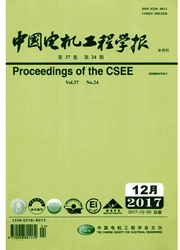

 中文摘要:
中文摘要:
电压降低和电压畸变是造成换相失败的主要原因。目前,换相失败的研究大多都是基于故障后基波电压的下降,而考虑电压畸变对换相失败影响的理论研究较少。谐波是导致电压畸变的重要原因,该文从换相过程的机理出发,提出了一种基于谐波电压时间面积的换相失败分析方法,该方法能够定量分析谐波对于换相失败的影响,研究表明,谐波对换相失败的影响程度由谐波电压幅值、相位等因素决定,其中低次谐波对于直流系统的换相过程影响较大。同时,通过对后续换相失败的理论推导和PSCAD/EMTDC仿真分析,发现故障恢复期间谐波引起的电压畸变是导致后续换相失败和直流故障恢复过程中功率波动的重要原因。
 英文摘要:
英文摘要:
Decrease of voltage and voltage distortion is the main reason causing commutation failure. At present, the study on commutation failure is mostly based on the change of fundamental voltage, while the voltage distortion is neglected. The voltage distortion which is mainly caused by harmonic voltage may result in the power oscillation and commutation failure. This paper proposed a method for commutation failure analysis based on harmonic voltage time area. The method can quantitatively analyze the influence of harmonic voltage for commutation failure. Research shows that the influence of harmonic voltage on commutation failure is decided by the harmonic amplitude, phase and other factors. Low order harmonics play a major role in commutation failure process. This paper also finds that the voltage distortion caused by harmonics is an important reason for follow-up commutation failure and the power fluctuation during the DC recovery process. The correctness of theoretical analysis was proved by PSCAD/EMTDC simulation results.
 同期刊论文项目
同期刊论文项目
 同项目期刊论文
同项目期刊论文
 期刊信息
期刊信息
